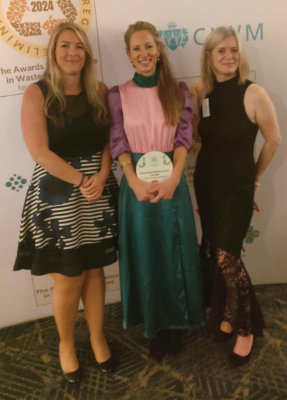BAPEN recently had the opportunity to speak to Faith Toogood, a dietitian at Royal Cornwall Hospital. Faith received an award from the Chief Allied Health Professionals Officer in 2024, alongside an award from Clinical Nutrition and the NHS Waste Management Award.

Faith’s pioneering work centres on enteral feed bottles, where she initiated a project which aimed to recycle high quality plastic used in enteral feed bottles and sterile water bottles, stopping them from being incinerated in clinical waste. Faith created a separate waste stream, enabling the segregation of these bottles at a ward level, to divert them into a specialist reprocessing system that repurposes the used bottles into domestic milk bottles. The project was then rolled out onto high usage wards and, once further funding was sourced to support collection of these bottles, Faith hopes to roll it out Trust-wide to increase the environmental and financial impact; this could see almost 11,000 tonnes of plastic recycled and huge savings in carbon emissions, plus financial savings for the Trust.
Can you tell us about your motivations for this project?
Every healthcare worker is aware of the scale of resources needed for our profession, and with that comes quite significant inevitable waste and the need for disposal. I work in dietetics, and I have held a long-standing frustration with the volume of plastic, particularly single-use plastic, we are discarding, day in, day out. It made me think, what if we could find a more environmentally responsible way to manage our plastic use, without compromising on our priority in delivering expert patient care.
The plastic we use in hospitals is frequently incinerated, which is an expensive and polluting process. Moreover, given the nature of the products we’re disposing, we often rely on clinical waste disposal which is more intensive and expensive, both for NHS trusts and waste management companies.
To achieve the NHS’ net zero by 2040 goal, it’s clear that we need real action now. Whilst the scale of the challenge ahead of us is big and can at times feel disempowering, I firmly believe that collective action is the only way we will achieve the huge positive developments needed – I knew that in my department, plastic disposal of enteral feed bottles would be a simple but valuable step towards a more sustainable critical care unit.
How successful was the project?

The project has been a great success!
As a Trust, we use approximately 140,000 bottles of sterile water/enteral feed and saline – this equates to over 11 tonnes of plastic which costs >£7,000 and produces 32 tonnes of carbon when incinerated (36 flights from London to NYC). None of this needs to be incinerated, it can all be recycled, so it’s great to see this project have the potential to recycle such huge quantities.
What were some factors that contributed to the project’s success?

The willingness of the team around me to engage with the recycling project was apparent from the get-go, and a huge motivator! Whilst it can be a challenge to rethink our ways of working, the ambition to make our profession more sustainable is widely held. Outside of our team, we partnered with BIFFA and Abbott to streamline the process of the feed bottle recycling, and ensure our new process was not adding to the already intense workloads of colleagues.
Interestingly, not all plastics are equally valued. To fit the needs of our work, the plastics present in our equipment are often high quality and therefore more valued in recycling. Further to the environmental benefit of reducing carbon emissions by avoiding clinical incineration, our project had the added benefit of saving the hospital money and creating a circular economy whereby our enteral feed bottles are processed and repurposed along with other high quality plastic into domestic milk bottles. Most of us have one of these in the fridge so again, this helped with the wider engagement.
Do you have any learnings regarding challenges that you overcame?
In terms of challenges, these mostly centred around 1) obtaining domestic funding for the collections and 2) space for storage; of the large collection bins outside but also for the sluice storage bins on the wards. Projects like this are never part of a role, so they do require a huge amount of dedication and goodwill to push forwards. Hopefully in the coming years this will be recognised and protected, dedicated time within our clinical jobs to enable those who have a drive for projects like this to do so.
Engagement was never an issue which I think is a reflection of the widespread understanding that we all have an obligation to be working in a more sustainable way.
How do you think people working in the NHS can help support and pioneer more sustainable practices?

In my opinion, the responsibility on healthcare professionals to consider sustainability in our practice is non-negotiable. The health service’s impact on waste generation and emissions is huge. As the largest employer in the country, the NHS has enormous potential to make a big difference in the UK’s environmental footprint, ensuring sustainable best practice is adopted at scale.
As it will be for most of us, any project work within sustainability is not part of our clinical role which means that the work involved with this was (and still is) all in addition to my clinical work. This means that progress will inevitably be slow but just keep moving forwards a step at a time. A key thing I’ve learnt from doing this project is that persistence pays off and I was determined to drive this project forward!
As AHPs, we need to tap into the immense power of scalability that lies within a nationwide industry such as the NHS. Look at the potential power of your project not in the impact that it could have within your ward, hospital or trust, but rather if it were to be scaled up across your county or nationally. I firmly believe that this is our collective responsibility to all do our bit; identify areas for improvement, look for small simple changes and then just start. A project will evolve over time, so just get going, find your support network and keep plugging away. Bringing about change within a huge industry like the NHS can seem daunting but just keep asking the questions, challenging the current way of doing things and striving for change.
I encourage you to check whether your hospital has a sustainability initiative or representative and see how you can get involved. If it doesn’t, why not be the person to set it up? There are lots of like-minded colleagues across the country, all championing sustainability practices in their workplaces, and we need to network and communicate with each other to ensure we’re scaling up where possible.


